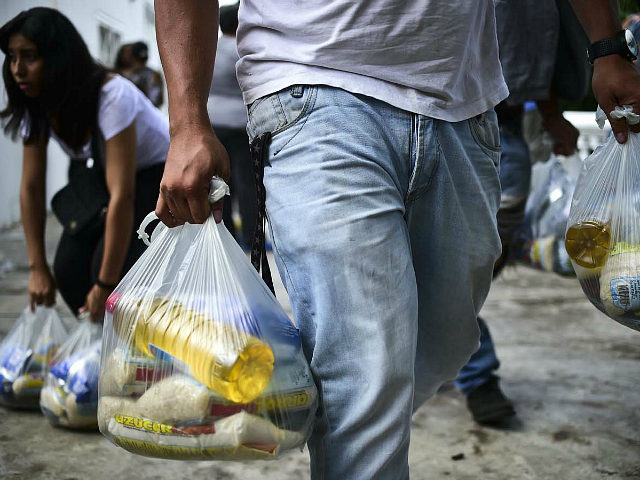Venezuela is imposing a new government food redistribution system in its capital, Caracas, that requires locals to acquire food from Socialist Party members, a move triggering national outrage as anti-socialist activists say the Party will use food to coerce citizens into supporting it.
President Nicolás Maduro announced last week the creation of the Local Committees for Supply and Production (CLAP), groups of Socialist Party members who will be in charge of controlling food supplies, preventing black market sales, and door to door distributions of food. Maduro has called these groups the “great instrument of the Revolution to win the economic war,” Argentine news outlet Infobae notes. Venezuelans are currently forced to buy food through a rations system that forces them to stand on supermarket lines up to eight hours long. Often citizens find out — after they have made their way through the lines — that the supermarket in question has run out of basic goods like rice, vegetable oil, and milk.
Distributing bags of food door to door, the government hopes, will diminish the length of these lines. The bags are meant to last 21 days, according to the government but carry only 3 kilos of rice, a kilo each of sugar and milk, a bag of beans and a liter of oil.
#4Jun Arroz,caraotas negras,azúcar,leche, aceite y condimentos.Esto repartió un CLAP del centro de Ccs pic.twitter.com/zYNxuKuaxh vìa @Dayidayi
— Reporte Ya (@ReporteYa) June 4, 2016
Bolsa de los CLAP hoy en Las Agüitas #Charallave 2 KG de arroz y 1Kg de Harina para 15 Días! Por dios! pic.twitter.com/6BELhxIsh4
— Pedro Vegas (@pedropvegas) May 27, 2016
In addition to distributing these bags of food, the CLAPs are held responsible for, according to Venezuelan newspaper El Nacional, “knowing how much merchandise exists in each point of sale [market], knowing the distribution routes to identify methods to circulate goods and transport them, keeping a balance of the amount of merchandise and if it was subsidized by state dollars, among others.”
Thus, in addition to distributing food as they see fit, the CLAPs are responsible for keeping track of all food in any given area and for ensuring no one the government has not authorized receives food.
Controlling food supplies has become increasingly important to the Venezuelan government as riots become more and more common. Last week, in the heart of Caracas, hungry patrons of a local market rioted after seeing a shipment of rice enter the market and almost immediately being told the food had been redistributed to the Bolivarian National Guard (GNB), the troops typically responsible for attacking peaceful anti-government protests. Chanting “we want food,” a crowd of hundreds began to march towards the presidential palace, halted only by the GNB using tear gas and violent Chavista gangs known as “colectivos” attacking both protesters and journalists.
Chavista socialist leaders have insisted that the riots make the CLAP distribution method necessary, though they have also assured Venezuelans that the groups are “an emergency measure, not intended to be the structural solution to the problem.”
Experts have expressed concern that placing the nation’s food supply at the mercy of Socialist Party loyalists can result in the starvation of anti-socialist activists or even those who prefer to abstain from political activity. “Excluding a social faction with something as delicate as acquiring food could even take on genocidal characteristics,” Venezuelan professor Magally Huggins said of the plan to have one party control all food. “It is a food apartheid,” she added.
“The CLAP are a tool to radicalize the political discrimination Venezuela endures thanks to this government,” opposition legislator Nora Bracho told reporters this week. “The CLAPs will only bring a small bag of food to followers of the government’s party, and those who do not follow the red ideology will continue to suffer hunger.”
“It is unacceptable that the little food that there is, the government distribute through its party,” Henrique Capriles Radonski, governor of Miranda state and Maduro’s opponent in the last two presidential elections, said of the move. “We cannot allow them to color food with politics. It is unacceptable that, due to political preference, people be denied food.”
Adding to concerns regarding the CLAP groups is the fact that they do not appear to have done much to shorten supermarket lines.
#4Jun Así la cola ade gente en Makro la Urbina vía @JavierStrad pic.twitter.com/4nmX5Y3cT1
— Reporte Ya (@ReporteYa) June 4, 2016
#5Jun Pueblo protestaba por comida en el Unicasa de la av. Bolivar en Margarita Vía @AlbertoRT51 pic.twitter.com/9DostOhgys
— Reporte Ya (@ReporteYa) June 5, 2016

COMMENTS
Please let us know if you're having issues with commenting.